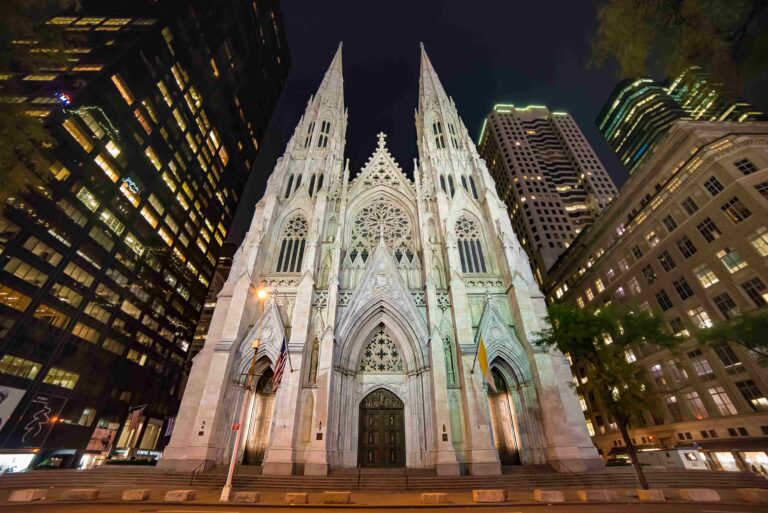- New York City, often stereotyped as secular, is actually America’s religious capital with nearly 9,000 Christian organizations and the highest church count.
- Washington D.C., America’s second-smallest major city, packs 67 churches per 100 square miles—the highest density in the nation.
- Southern cities like Dallas and Houston demonstrate the highest rates of daily prayer.
A recent study by
MyCross has identified
the U.S. cities with the highest levels of religious engagement, focusing on key indicators such as
the percentage of people identifying as Christians, daily prayer rates, number of churches, Christian nonprofit organizations, and the number of religious events held yearly. Cities were selected based on their population size and regional representation. The final scores were then normalized on a scale from 1 to 100, with 100 representing the city with the highest religious engagement.
Findings summed up
| City |
People identifying as Christian |
Daily Prayer Rates |
Religious Events |
Christian nonprofit organizations per 100 miles² |
Churches per 100 miles² |
Religiousness Score |
| New York City |
57% |
40% |
177 |
3 |
32 |
100 |
| Los Angeles |
46% |
41% |
168 |
6 |
6 |
91 |
| Philadelphia |
62% |
41% |
502 |
4 |
18 |
85 |
| Dallas |
63% |
48% |
166 |
6 |
4 |
80 |
| Washington |
56% |
45% |
145 |
1 |
67 |
75 |
| Chicago |
59% |
40% |
77 |
5 |
21 |
70 |
| Houston |
67% |
48% |
125 |
13 |
3 |
65 |
| Atlanta |
64% |
52% |
138 |
3 |
5 |
60 |
| Riverside |
62% |
46% |
336 |
3 |
3 |
56 |
| Miami |
59% |
48% |
67 |
1 |
22 |
52 |
You can see the full research here.
New York City tops the ranking with a score of 100, standing out with the highest number of churches among all cities studied. The city houses nearly 9,000 Christian nonprofit organizations, the most in the country while maintaining the second-highest church density nationwide. Despite moderate Christian identification rates of 57%, New York’s religious infrastructure makes it the undisputed religious capital of America.
Coming in second, Los Angeles scores 91, featuring the second-highest number of Christian nonprofit organizations. Despite having the lowest percentage of Christian-identifying residents among the top cities, Los Angeles maintains significant religious activity with 168 yearly religious events.
Philadelphia follows in third with a score of 85, hosting the highest number of religious events annually, which is nearly three times New York’s count. With 62% of residents identifying as Christian, Philadelphia maintains a solid religious presence with 18 churches.
Dallas comes in fourth with a score of 80, showing strong Christian identification at 63%—higher than all three cities above it. Dallas hosts nearly 6,000 Christian nonprofit organizations—almost double Philadelphia’s count. Dallas residents demonstrate high religious practice with 48% engaging in daily prayer.
Washington, D.C., lands in fifth with a score of 75. It exhibits the highest church density at 67 churches, more than double any other city except New York. The nation’s capital maintains a moderate Christian population (56%) while supporting over 4,600 Christian nonprofit organizations in its small area.
Chicago is sixth with a score of 70, featuring the third-highest number of churches (48) among studied cities. With 59% of residents identifying as Christian—higher than both New York and Washington D.C.—Chicago maintains a density of 21 churches. The city includes over 4,700 Christian nonprofit organizations despite having the lowest daily prayer rate.
Houston is seventh with a score of 65, demonstrating the highest percentage of Christian-identifying residents. The city shows strong religious practice, with 48% of residents engaging in daily prayer. Despite being the largest city by area, Houston maintains the highest concentration of Christian nonprofits miles at 13—more than twice most other cities.
Atlanta ranks eighth with a score of 60, exhibiting the highest daily prayer rate at 52%—the top rate among all cities studied. Atlanta supports over 5,100 Christian nonprofit organizations—more than Washington D.C. and Chicago. Despite these strengths, Atlanta’s limited number of churches (only 6) impacts its overall ranking.
Riverside is ninth with a score of 56, hosting 336 religious events annually—second only to Philadelphia. With 62% of residents identifying as Christian and 46% practicing daily prayer, Riverside maintains strong religious participation. The city faces severe infrastructure limitations, with only two churches—the lowest number among all cities surveyed.
Miami rounds out the top ten with a score of 52. It maintains a moderate Christian population (59%) with high daily prayer rates (48%). Despite its size limitations, Miami achieves a church density of 22 churches, the third highest in the study.
A spokesperson from
MyCross commented on the study:
“The physical presence of faith institutions often diverges dramatically from the personal practice patterns of residents. We’re seeing that the most visible markers of religiosity—buildings and organizations—don’t necessarily correlate with individual spiritual habits. This disconnect reveals how faith in America operates on parallel tracks: the institutional and the personal, each with its own unique footprint and impact. Future research must account for both dimensions to truly capture religious vitality across communities.”


